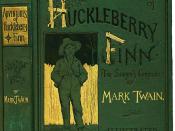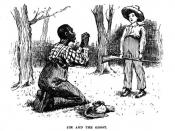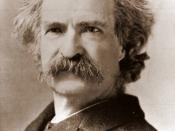In the story of Huckleberry Finn, Mark Twain uses many different types of symbols to get Twains numerous messages across. Twain signifies the Mississippi river as a symbol to get away from society for Huck and Jim. Twain also criticizes the way society runs and the things it teaches everyone to be. The river vs. land setting in Huckleberry Finn symbolizes Huck's struggle with himself versus society; Twain suggests that a person shouldn't have to conform to society and should think for themselves.
Throughout the novel, Mark Twain shows the society that surrounds Huck as just a little more than a set of degraded rules and authority figures. When the new judge in town allows Pap to keep custody of Huck, the judge privileges Pap's "rights" to his son as his natural father over Huck's welfare, "He said he'd cowhide me till I was black and blue if I didn't raise money for him [...]
When [Pap] got out the new judge said he was going to make a man of him. So he took him to his own house, and dressed him up clean and nice, and had him to breakfast and dinner and supper with the family" (16). Even though Huck is being mistreated, the new judge overlooks that and treats Huck as though he is a piece of property, like a slave. In comparing the condition of slaves to Huck's situation at the hands of Pap, Twain suggests that it is impossible for a society that owns slaves, to be right, no matter how "civilized" that society believes and proclaims itself to be. Huck encounters people who try to change him or civilize him throughout the book, one in the beginning of the novel was the Widow Douglas, "The Widow Douglas she took me for her son,


